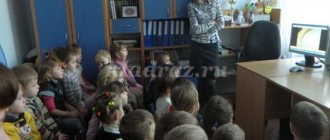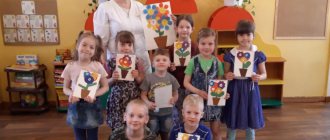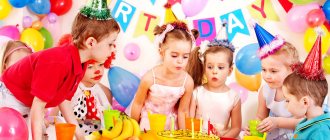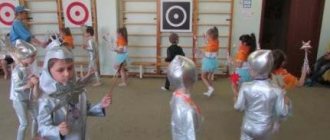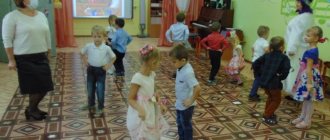Psychology Week plan “All people need kindness”
Kindness is an inner quality of each of us. People capable of good deeds are a rare phenomenon in the modern world, and today they can rightfully be called wizards. After all, they are ready for good deeds both in winter and in summer.
Children are our joy, but they are not always able to notice how they said an offensive word to each other, quarreled with someone and cannot make peace. Psychology Week “All People Need Kindness” is aimed at developing attention to peers, developing ideas about good and evil, and developing a friendly attitude towards each other.
The proverbs of the Russian people say: “Life is given for good deeds,” so the motto of our week was the words: “All people need kindness, let there be more good ones!”
Psychology Week plan “All people need kindness”
Psychology Week plan “All people need kindness”
Plans for a psychology week in kindergarten
Monday "Kindness Day"
- The action is a motivator for teachers and parents of students “Do Good” - decorating the corridor of a preschool educational institution with statements and proverbs about goodness and good deeds.
- Training with elements of the conversation “What is kindness?”, psycho-gymnastics “Palms”, games “I should not - I must”, “The Secret”, “Bridge of Friendship”.
- View and discuss the presentation with fairy tale characters.
- Drawing a portrait of a kind person.
- Design of the exhibition of children's drawings "The Kindest Man".
- Flash mob “A minute of hugs.” (entire kindergarten)
- Campaign for parents “Continue the statement” - “A kind person is...”
Participants: pupils of senior groups, teachers, parents of children of senior groups.
Tuesday “Good Mood Day”
- Promotion “Good wishes in a box”.
- Games with children: “Magic hands”, “Who will say more kind and warm words”, “Good elves and people”, guessing riddles about good and evil fairy tale heroes, exercise “Knot of good deeds”.
- Watching cartoons about good deeds.
- Consultations for parents “Sow kindness in children’s souls”, “Secrets of raising a polite child”.
Participants: pupils of secondary groups, teachers, parents of children of secondary groups.
Wednesday “Visiting the Kids”
- Promotion “Umbrella of Predictions”.
- Promotion “Books for Kids”.
- Children - children “Give joy to the kids” - handmade gifts for the youngest children in kindergarten; games with children of the early group (teachers and pupils of older groups participate).
- Master class for teachers “Angel of Good”.
Participants: pupils of the early group, senior groups, teachers, specialists and parents of the early group.
Thursday “Day of Good Deeds”
- Action "Meadow of spring mood".
- Training for children “Hurry to do good.”
- Children - children "Knizhkina Hospital".
- Design of the collage “Our good deeds”.
- Watching the cartoon "Tsvetik-seventsvetik"
Participants: pupils of preparatory groups, teachers, parents.
Friday “Kindness rules the world”
- Campaign for teachers and parents “Wishes to each other.”
- Free ads "Take a little happiness."
- Activating communication “Being kind is useful.”
- Children - children "Theater for Kids" - pupils of secondary groups and teachers participate.
Participants: pupils of primary and secondary groups, teachers, parents.
Summary of the week
- Publication of the newspaper “All People Need Kindness.”
- Design of an information poster “What is kindness through the mouths of children.”
- Questionnaire - feedback from teachers and parents.
Topic: Plan for Psychology Week “All people need kindness.” Author: Yulia Mikhailovna Frolova, teacher-psychologist MBDOU Kindergarten “Kolobok” Kurgan region, Petukhovo.
Help for teachers
The psychologist is obliged to actively interact with the teaching staff of the kindergarten. Work with employees can be carried out in various directions:
- At pedagogical councils, meetings, lectures and seminars, the specialist talks about effective methods and techniques that make it possible to best organize work with students.
- If necessary, the psychologist helps the teacher establish contact with the child and suggests appropriate forms and methods of interaction.
- A teacher-psychologist helps resolve conflict and non-standard situations that arise in a team. Maintains a favorable psychological climate.
- Any kindergarten employee can contact a teacher-psychologist not only for work issues, but also for personal issues.
Project program: “Psychological health of preschool children”
To make a child smart and reasonable -
make him strong and healthy.
Jean Jacques Rousseau
Program (project) “Psychological health of preschool children: preservation and strengthening”
Author-compiler:
Taranova Nadezhda
Goal:
* development and strengthening of the psychological health of preschool children; * psychoprophylaxis and correction of negative problems.
Objectives:
* create conditions for the full physical and mental development of preschool children, their emotional and personal well-being.
* adjust the actions of all participants in the educational process for the effective development and strengthening of the psychological health of children.
* identify the problem in time and provide appropriate assistance to the child.
* ensure that the child graduates to school in accordance with the developed “Graduate Model”
“Model” of a graduate of the preschool educational institution “Solnyshko”
Development of cognitive
activities
Development of psychophysiological functions
Health status
Psychological and social readiness for school
- There are no violations in the phonemic structure of speech or sound pronunciation, speech is correct and distinct;
- There are no violations in the phonemic structure of speech or sound pronunciation, speech is correct and distinct;
- Health group and anthropometric data correspond to age;
- Health group and anthropometric data correspond to age;
- Ideas about the world are quite detailed and specific;
- Ideas about the world are quite detailed and specific;
- Desire to study at school;
- Desire to study at school;
- The child performs age-appropriate physical movements
- Speech is restrained, expressive, grammatically correct;
- Realizes the importance and necessity of learning;
- The hand is well developed: the child wields a pencil and scissors;
- Makes contact quite easily, perceives the situation correctly, behaves adequately;
- Shows a positive emotional state in movement.
- Orients himself in space quite well, coordinates movements, is mobile, dexterous;
- The child is cognitive, active, completes tasks with interest, independently;
- Coordinates himself well in the “eye-hand” system;
- Organized behavior
- Correctly determines the content and meaning of what is being analyzed, summarizing it in a word, knows how to compare, discovers natural connections
- Maintains the goal of the activity, outlines its plan, selects the means, checks the result;
- The volume of visual perception corresponds to the average age indicators
- The pace of activity corresponds to the average age
The entire process, starting from a child’s admission to a preschool educational institution and ending with admission to the 1st grade of a general education school, is viewed in this program (project) as a single comprehensive process of preserving and strengthening the psychological health of preschoolers
Program (project) structure:
The program (project) includes
3 subprograms:
- “The path to kindergarten” (Child’s adaptation to preschool educational institution) – I and II junior groups;
2.
“The path to your Self” ( Emotional and personal development of children) – middle and senior groups;
3.
“Path to school” (Preparation for school and prevention of maladjustment) – preparatory group.
Each subroutine:
- Designed for a certain age;
- Has its own goal and objectives necessary to solve and obtain a positive result in work;
- Allows planning of activities for preventive and correctional and developmental work after tracking the primary diagnostic results;
- Has its own implementation mechanism;
- Forms of work with children, parents and employees of preschool educational institutions;
- Has its expected results.
Contents of the program (project):
1. Subprogram “The Path to Kindergarten”
(Child’s Adaptation to Preschool Education) – I and II junior groups
Goal:
psychodiagnostics, prevention and overcoming maladaptation of younger preschoolers to the conditions of kindergarten.
Tasks:
- Create conditions for protecting and strengthening the health of children, facilitating the period of adaptation to the conditions of a preschool educational institution.
- To develop healthy lifestyle skills in children and to promote the full physical development of children.
- Laying the foundations of a future personality.
2. Subprogram “Path to your Self”
(Emotional and personal development of children: correction and prevention of the most typical problems in the development of preschool children) Middle and senior groups
Goal:
Psychoprophylaxis and correction
of the development
of the emotional and personal sphere
preschoolers
Tasks:
- Teaching Positive Self-Attitude
and acceptance of other people.
- Teaching reflective skills.
- Formation of the need for self-development.
- Promoting the growth and development of the child.
3. Subprogram “Path to school”
(preparing for school and preventing maladjustment) preparatory group for school
Goal:
Preparing a child for school and preventing a maladjustment period
Tasks:
- Development of initiative,
curiosity, randomness,
abilities for creative self-expression;
- Stimulating the communicative, cognitive, gaming and other activities of children in various types of activities;
- Development of competence in the field of relationships to the world, to people, to oneself; inclusion of children in various forms of cooperation (with adults and children of different ages);
- Ensuring the emotional well-being of each child, developing his positive sense of self.
The subroutine includes the following
miniprograms:
- Mini-program for preschoolers attending a school preparatory group:
"Introduction to school life."
2. Mini-program for home children entering first grade:
"Five June meetings."
Stages of implementation of work under the “Psychological Health: Preservation and Strengthening” Program during the academic year
- 1. Diagnostic
— 1
. Adaptation process in younger preschoolers;
2.
Emotional and personal development of middle-aged and older children;
3.
Preparing children for school
— Development of individual and group forms of work.
- 2. Information and educational
— Informing parents about existing disorders in the development of children and methods of correctional and developmental work. — Education of teachers and employees of preschool educational institutions about the introduction and implementation of correctional and developmental programs in the educational process.
- 3. Practical
Organization of educational, correctional and developmental activities in accordance with the goals and objectives of the program.
- 4. Control (analytical)
Determining the effectiveness of correctional and preventive work with preschool children at the final stage. Diagnostics. Monitoring. Tracking the dynamics of children's development at different age stages. Conclusions and offers.
Expected results:
- Positive adaptation of children to preschool conditions;
- Psycho-emotional well-being of children;
- Good adaptation to school;
- Compliance of children-graduates of the preschool educational institution “Model of a preschool educational institution graduate”
What a preschool psychologist does not have the right to use when working with children
Child psychology is not a branch of medicine, so a preschool psychologist:
- does not have the right to diagnose diseases;
- does not prescribe medications;
- does not provide specific treatment;
- does not draw up any program calling on parents to take mandatory actions in raising their children.
Also, the law strictly prohibits any manipulations that can harm the physical or mental health of students!
We repeat, the work of a psychologist is of a recommendatory, advisory, research and helping nature, therefore the main points of his professional activity will be:
- tips to help preschool children acclimatize to kindergarten conditions;
- assistance in the development and interaction of children with the outside world;
- analysis and correction of situational and behavioral issues that can harm the health of children;
- support for children, their parents and preschool staff in interaction and mutual understanding with each other.
Project at the preschool educational institution “The year before school”
- May 22, 2015
Conference “Project activity in an educational institution - 2015”
Nomination “Pedagogical project in a preschool institution”
Being ready for school does not mean being able to read, write and do math. To be ready for school means to be ready to learn all this” Wenger L.A.
Currently, kindergartens and schools are solving the difficult problems of transitioning to new federal state educational standards. According to the law of December 29, 2012. No. 273-FZ “On Education in the Russian Federation”, preschool education is the first stage of general education. According to Article 44, “parents (legal representatives) of minor students have a priority right to the education and upbringing of children over all other persons. They are obliged to lay the foundations for the physical, moral and intellectual development of the child’s personality.”
In modern education, the problem of developing psychological qualities in children of senior preschool age that would ensure successful adaptation to a new stage of education and mastery of educational activities during schooling is recognized as one of the most pressing.
Working with children who have general speech underdevelopment includes correctional and educational influence on the part of preschool educational institutions and parents. Cooperation between family and kindergarten is a necessary condition for a child’s readiness to study at school. According to the Federal State Educational Standard for Education, interaction with the families of pupils includes: providing psychological and pedagogical support for the family and increasing the competence of parents in matters of development and education, protecting and promoting the health of children (clause 1.6); creating conditions for the participation of parents (legal representatives) in educational activities (clause 3.1).
It should be noted that in our preschool educational institution, not all parents have an idea about the psychophysical capabilities of children, which allow them to successfully master various types of activities and norms of behavior necessary when studying at school. At the same time, modern parents observe: lack of time, unreasonably high demands on children’s education without taking into account the real capabilities of preschoolers. That is why the development of a joint project between a teacher-psychologist and a speech therapist for parents, “The Year Before School,” becomes relevant.
Goal : creating favorable conditions for the educational experience of parents and increasing the effect of family socialization of preschoolers on the eve of school.
Tasks:
1. To create ideas among parents about psychological qualities that would ensure the child’s successful adaptation to a new stage of education and mastery of educational activities during schooling.
2. To provide parents with practical experience in playing partnerships with children:
- introduce games that develop the child’s cognitive sphere;
- show the possibility of using words as a playful means of communication with a child.
3. Enrich the methodological box for parents “The Year Before School”.
Expected results:
Establishing partnerships - children, teachers, parents.
Formation of parents’ understanding of the family as the main resource for preparing a child for school.
Formation of universal educational actions of future schoolchildren.
The success of a child's adaptation to school.
Project type:
- According to the dominant activity in the project: correctional and developmental.
- Content: psychological and pedagogical.
- By the nature of contacts: within the preschool educational institution.
Implementation period: August 2014 – May 2015.
Practical application of the project: for educators, speech therapists, educational psychologists of preschool educational institutions.
Participants in the project: Children of the preparatory group for school, parents of students, teacher-speech therapist, teacher-psychologist, primary school teachers. Classes for parents are held 1-2 times a month, lasting 30-40 minutes.
The practical significance of the project lies in the development of psychological and pedagogical recommendations for parents that promote the development of psychological qualities in children, which ensure the success of the child’s adaptation to a new stage of education and the development of educational activities during schooling. The developed methodological material can be useful to parents, educational psychologists, and speech therapists.
All results and practical materials obtained during the implementation of the project will be reflected:
- in materials published in the media; websites, kindergarten blog;
- in conducting master classes and in speeches by teachers at seminars, scientific and practical conferences and meetings of methodological associations;
- in creating a media library of copyright developments.
Appendix No. 1.
Appendix No. 2.
Author: Irina Semenovna Girsh, educational psychologist of the highest qualification category, 40 years of work experience, Natalya Valerievna Shishlyannikova, teacher-speech therapist of the first qualification category, 15 years of work experience, MBDOU Kindergarten of care and health “Sanatorny”, Abakan, Republic of Khakassia .
Diagnostics
In modern kindergartens, classes are conducted according to the education and training program, which was approved by the Ministry of Education for the coming years. That is, all classes in the kindergarten are structured and conducted based on the requirements for the level of knowledge by age categories of children. Let’s say, by the age of three, children should know colors and understand what “more” and “less” are, and by six they should be able to count to 20, solve simple addition and subtraction examples, and have a good understanding of how a vowel sound differs from a consonant – This is the level required to enter school.
Training
A teacher-psychologist is obliged to regularly improve his qualifications, take courses, attend methodological associations of psychologists, participate in seminars, and master new technologies for the development and education of children.
A teacher-psychologist should know:
- Laws, regulations and other regulatory legal documents in the field of education, including the Convention on the Rights of the Child.
- Psychology: general, differential, children's, developmental, personality, social, medical, fundamentals of occupational psychology and psychological counseling.
- General pedagogy, neuropsychology, fundamentals of defectology.
- Labor protection standards and safety regulations.
- Rules for providing first aid.
The successful development of preschool children, their emotional well-being and even the psychological climate in the teaching staff depend on how professionally the psychologist fulfills his duties. This is a specialist who helps children, their parents and staff live harmoniously, develop and learn together, feeling easy and comfortable.


